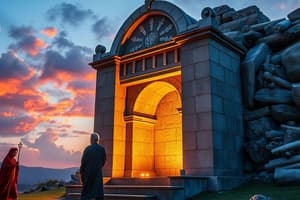Podcast
Questions and Answers
Who was an eyewitness of the historic event and a childhood friend of Bonifacio?
Who was an eyewitness of the historic event and a childhood friend of Bonifacio?
Guillermo Masangkay
Where was the first cry for freedom that started the uprising heard?
Where was the first cry for freedom that started the uprising heard?
Caloocan
Who were some of the leaders of the Katipunan present at the meeting in Balintawak on August 26, 1896?
Who were some of the leaders of the Katipunan present at the meeting in Balintawak on August 26, 1896?
Bonifacio, Emilio Jacinto, Aguedo del Rosario, Tomas Briccio Pantas, Teodoro Plata, Pio Valenzuela, Enrique Pacheco, Francisco Carreon
Who left the town of Caloocan after being closely watched by the agents of the Spanish authorities?
Who left the town of Caloocan after being closely watched by the agents of the Spanish authorities?
When did the Cry of Balintawak take place?
When did the Cry of Balintawak take place?
Which barrio in Caloocan hosted a big meeting attended by Katipunan leaders on August 26, 1896?
Which barrio in Caloocan hosted a big meeting attended by Katipunan leaders on August 26, 1896?
Which organization did the leaders present at the meeting in Balintawak compose the board of directors for?
Which organization did the leaders present at the meeting in Balintawak compose the board of directors for?
Name one of the delegates who attended the meeting in Balintawak.
Name one of the delegates who attended the meeting in Balintawak.
What did the first cry for freedom signify on August 25, 1896?
What did the first cry for freedom signify on August 25, 1896?
Who was the cabeza of the barrio of Caloocan where the meeting in Balintawak was held?
Who was the cabeza of the barrio of Caloocan where the meeting in Balintawak was held?
Flashcards
Cry of Balintawak date
Cry of Balintawak date
August 26, 1896
Cry of Balintawak location
Cry of Balintawak location
Balintawak, Caloocan
Katipunan leaders at Balintawak
Katipunan leaders at Balintawak
Bonifacio, Jacinto, del Rosario, Pantas, Plata, Valenzuela, and Pacheco
Bonifacio's escape
Bonifacio's escape
Signup and view all the flashcards
Role of Balintawak
Role of Balintawak
Signup and view all the flashcards
Katipunan organization
Katipunan organization
Signup and view all the flashcards
Caloocan meeting attendees
Caloocan meeting attendees
Signup and view all the flashcards
Guillermo Masangkay's role
Guillermo Masangkay's role
Signup and view all the flashcards
Caloocan's cabeza
Caloocan's cabeza
Signup and view all the flashcards
Significance of the Cry
Significance of the Cry
Signup and view all the flashcards
Study Notes
The Cry of Balintawak and Other Versions
- The Cry of Balintawak refers to the meeting held on August 26, 1896, where Andres Bonifacio and other Katipuneros discussed the uprising against the Spanish authorities.
- The meeting was held at the house of Apolonio Samson, the cabeza of the barrio of Caloocan.
- Attendants included notable leaders of the Katipunan, such as Emilio Jacinto, Aguedo del Rosario, and Pio Valenzuela.
Andres Bonifacio's Speech
- Bonifacio addressed the people outside the meeting hall, stating that the Spaniards would shoot them anyway, and it was better to start the revolution.
- He asked the people to give a pledge to revolt and destroy their cedulas (tax certificates) as a sign of slavery to the Filipinos.
The Cry of Pugad Lawin
- Pio Valenzuela's version of events, referred to as the Cry of Pugad Lawin.
- After the tumultuous meeting, many present tore their cedulas and shouted "Long live the Philippines!"
The Cry of Bahay Toro
- Santiago Alvarez's version of events, referred to as the Cry of Bahay Toro.
- A meeting was held on August 23, 1896, at the barn of Kabesang Melchora (Melchora Aquino), with around 500 Katipuneros attending.
- On August 24, around 1,000 Katipuneros gathered, and Bonifacio led a meeting inside the big barn, concluding with loud cries of "Long live the Sons of the Country!"
Gregoria de Jesus' Version
- Written by Gregoria de Jesus, wife of Andres Bonifacio and a participant in the event.
- She stated that the activities of the Katipunan reached nearly all corners of the Philippine Archipelago before being discovered by the Spanish authorities.
- After being closely watched, Bonifacio and other Katipuneros left the town, and the uprising began with the first cry for freedom on August 25, 1896.
Studying That Suits You
Use AI to generate personalized quizzes and flashcards to suit your learning preferences.
Description
Test your knowledge on Guillermo Masangkay's The 'Cry of Balintawak' and the events of August 26, 1896. Explore the historical meeting presided by Andres Bonifacio and the discussions leading to the uprising.




